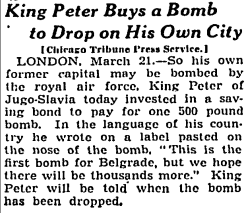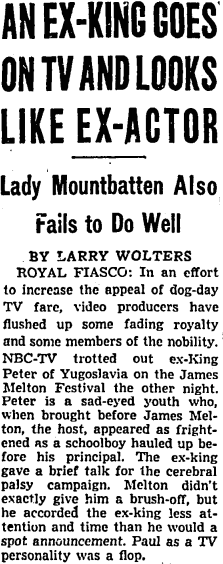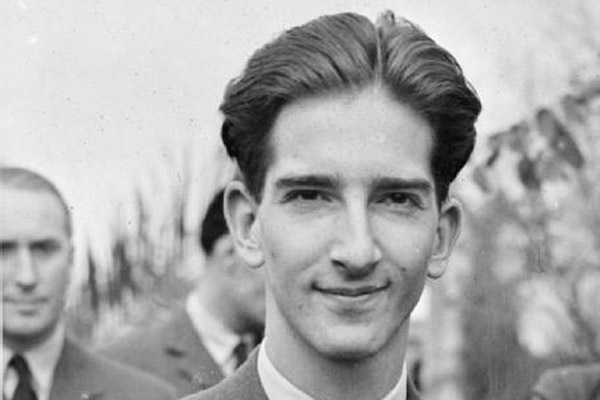Count among the many wonders of Chicagoland I was unaware of: King Peter II of Yugoslavia was buried in Libertyville, the only such European monarch to be buried in this country. Now his body is on the way back to his homeland. How did the king—Cambridge-educated, husband of a Greek queen, and employee of a Los Angeles savings and loan—get here? And why is he on his way back after four decades of rest in the suburbs?
King Peter II was something of an accidental king. His father was the second son of Peter I of Serbia (1903-1918) and the Kingdom of Serbs, Croats, and Slovenes (1918-1921); Alexander I only became crown prince because his temperamental brother George was pressured out of the role after kicking and killing his servant. As you might expect from the name of his kingdom, Alexander I ruled over a culturally tense land, and in 1934 he was killed (along with French Foreign Minister Louis Barthou) by a member of the International Macedonian Revolutionary Organization, which supported the autonomy of Yugoslav Macedonia, which it eventually obtained in 1991.
Crown Prince Peter, now Peter II, was 11 years old. His cousin, Prince Paul of Yugoslavia (nephew of Peter I), led the regency that ruled Yugoslavia, and signed on to the Axis pact between Germany, Italy, and Japan, effectively making Yugoslavia an ally of Nazi Germany and receiving a promise of territorial integrity in exchange, a few months before the king was to ascend to his throne on his 18th birthday. Two days later, a military coup led by the Yugoslav air force commander overthrew the regency and installed the 17-year-old Peter II as king. A couple weeks later, Yugoslavia fell and Peter II was a 17-year-old king without a country, having fled to the Middle East after escaping by climbing down a drainpipe; by 1945, he could no longer return home.
The next year, Peter II—whose 13th birthday was celebrated with a military parade—was ready for war.

Then he came to America, taking in a Yankees game and meeting with the president. Here in Chicago, local Serbs and Croats were hashing out the meaning of King Peter, in a way that reflected the tensions that would resume decades later. "The Serbians my have their king if they want to, but the Croatians are not at all enthusiastic about King Peter," a "V. Susa" presciently wrote to the Tribune. "They had plenty of dictatorship and tyranny during the past 20 years. The Croatians want a free and independent Croatia after the pattern of the United States, and would not oppose a federation of the nations of the nations of the Balkan penninsula which would include the Serbs, Croats, Slovenes, Bulgarians, and the rest of the Balkan peoples."
Meanwhile, Princess Alexandra of Greece and King Peter met cute in London: "The princess, a pretty, dark-haired girl, used to serve waffles and coffee to American officers and nurses over a snack bar at the London Red Cross club. There she met King Peter, a slender young man in naval uniform who often dropped in to listen to the music of a United States infantry band" (Chicago Tribune, 8/1/43). But it would not be without consequences:
Love for Princess Alexandra, 22-year-old niece of the king of Greece, has cost King Peter of Jugo-Slavia the chance to lead his country's battle against the Nazis, the Daily Express indicated today.
The newspaper said that the young king, who also is 22 years old [sic—he was 20], now "faces the harsh consequences of the decision to which he was led six months ago.
At that time, the Express said, Peter turned down a suggestion that he dissolve his cabinet and fly to the headquarters of Marshal Josip [Tito] Broz, leader of the Partisan army opposed to the king and his war minister, Gen. Draja Mihailovitch.
King Peter had two options—join the anti-monarchist and future dictator Tito against the Nazis, or continue his government-in-exile in Cairo. Talk of detente was made; Tito, leading Yugoslavia against the Nazis, had obtained the support of the Allies, and held all the power. And he was hostile towards King Peter, attempting to freeze the king's overseas assets. But King Peter returned, giving Tito control over the army, not to mention access to the monarchy's gold. But Tito pushed further, attempting to force King Peter back into a regency, and the existing cabinet refused to disband. A war of words followed; Tito claimed he wanted to establish a democracy, and King Peter accused him of building a dictatorship. Tito killed the monarchy in 1945, and his government was immediately recognized by the U.S., "with some reservations on its domestic policies."
Any possibility of returning to power, or even to Yugoslavia, was over. His country became a communist dictatorship. (He was now just a rich man with the novelty of a useless crown. His cousin, Prince Alexander, was discovered in 1948 selling washing machines in Bristol, England. "Great future in them," he told the AP.)
And so King Peter, traveling the U.S., came to Chicago in 1948. He stayed at the Drake, took in the Armour stockyards and Inland Steel, "where many Yugoslavs work," and visited the monastery of St. Sava, "where he remained most of the day for services and dinner." 22 years later, he would be buried there.
King Peter kept returning, to increasingly small headlines. A few years ago, he had been the guest of FDR; in 1949, the "young, modern, democratic monarch who refused to accept the situation in his country" visited the Kohler Club in Sheboygan to address the Kohler Woman's club on the subject of "My Kingdom for Freedom."
In 1951, he went on the local NBC station to find that he just wasn't made for these times.

Things continued to decline. He began divorce proceedings with his wife shortly thereafter, and was described by London's Sunday Express as the unluckiest of all Queen Victoria's great-great grandchildren (through his mother, Maria of Yugoslavia, daughter of Queen Marie of Romania, who was the daughter of Prince Alfred, a son of Queen Victoria), of whom there were many as monarchies fell across Europe.
Peter, the paper said, is never likely to get back his throne. It explained that he is reported to be divorcing his wife, Alexandra, was involved in an "unpleasant scene" last week at the Biarritz party given by the Marquis de Cuevas, had a "check bounce in Paris," and faces "money tangles."
They reconciled in 1955—the same year King Peter spoke to the University Guild of Evanston on "A King's Heritage." His wife, Queen Alexandra, published an autobiography the next year, For Love of a King, described as "an impatient regret for the waste of talent and enormous sums of money such a useless upbringing permits and a sturdy swing toward that funny system derided by Europeans as the American way of life. In this time of agonized reappraisal of the evils of P.S. 102, the self-satisfaction this book will induce among its alumni is well worth reading it for." Ilka Chase, the actress and writer, encountered the couple on the Riviera:
Much of his behavior in futile pursuit of his lost throne was so shabby, ill-advised, and stupid as to seem incredible. I should think the poor devil would hate to see it in black and white, but apparently he did squander his entire fortune, accumulate staggering debts, desert his wife, lie to her, try to have their son taken from her, and in general behave in a manner far from loveable. But she loved him. After estrangement and desertion they once more are reunited and are living in a four room apartment in Cannes, when I went to call on them. They are candid in explaining that their income is from Serbians living in exile who contribute weekly whatever they can spare so that their king and queen may maintain a home.
(Prince Alexander, his pavement-pounding cousin, "made a success of a job as a washing machine salesman," moved on to a Greek shipping firm in Paris, and wed Princess Maria Pia of Italy, receiving special dispensation from the Vatican, as King Peter's marriage fell on and off the rocks.)
In 1959, King Peter re-emerged in Chicagoland. In Waukegan.
The 34 year old monarch was greeted in a drizzling rain by Mayor Robert Sabonjian and City Clerk Howard Guthrie and taken thru a marine engine plant and the city's new Thomas Jefferson Junior High school. He was treated to a dinner of Lake Michigan trout, with sturgeon and smoked chubs as appetizers, and pronounced the meal "most exquisite." The former king also met Waukegan's weather prophet, Mathon Kryitsis, a fisherman who for many years has forecast the severity of the winter by gauging the depth at which perch are feeding.
Kyristis ran Mathon's Seafood Restaurant in Waukegan and appeared on WGN to do his weather forecasting—"He always claimed he 'talked to the fish,' according to his son."
He kept coming back every few years, drawn back by the Serbian National Defense Council, an anti-communist organization headquartered here. But Tito's split with Stalin—Yugoslavia was one of the originators of the Non-Aligned Movement, founded in Belgrade in 1961—meant that the U.S. and other Western countries were friendly with the country despite its communist rule. So King Peter had to stay quiet on political issues, even as he was in town for political reasons. "The state department has told me that I am a guest in your country, and so I must not discuss American foreign policy towards Yugoslavia," he told the Tribune on another visit in 1963.
A few months later, Princess Alexandra took an overdose of sleeping pills and slipped into a coma, but recovered after two days; it emerged that, during their estrangement, she had tried to commit suicide by slashing her wrist.
Yet the king kept coming back to Chicago. In 1964, it was a party for the Knights of Malta in Wilmette; in 1965, a reception at the Alliance Francaise and brunch at Children's Memorial Hospital; in 1966, a commemoration of Draja Mihailovich at the Milhailovich Memorial Home (now apparently a church in Little Village); in 1967, to view the Knights of Malta's plans for a convalescent hospital in Carol Stream and "to knight 50 persons from Illinois, Iowa, Minnesota, and Wisconsin" at the Drake.
That year, King Peter finally got a job: at the Sterling Savings & Loan Association in Los Angeles. Asked if such a job hurt his image, he replied, "I think it raises my stature a little." Three years later, he died of cirrhosis of the liver. He had never returned home, and could not in death; Tito still ruled Yugoslavia. So he was buried in Libertyville at St. Sava, where he had spent the day on his first visit to the city.
But Yugoslav antipathy towards the monarchy began to chill as the promise of communism died. By the 1990s, opinion had turned. There's a certain historical irony in that a soap opera was involved.
Indeed the first family member sneaked into Yugoslavia via television. When the Yugoslavs bought the popular American TV series "Dynasty," no one in Yugoslavia was aware that one of its stars, actress Catherine Oxenberg, was a Karadjordjevic.
Within a few months, however, most Yugoslavs knew that Oxenberg, who plays Joan Collins's willful daughter on the show, was granddaughter of Prince Paul, who ruled Yugoslavia as regent for eight years before the German invasion in 1941. For the Serbs, who account to slightly more than a third of Yugoslavia`s 23 million people, her success was a source of pride.
The first to arrive in Yugoslavia in person-and to a royal welcome-was Oxenberg's mother, Princess Elizabeth. She was so pleased that she started taking Serbo-Croatian lessons and announced intentions to run for Parliament.
Oxenberg later had her own reality show, I Married a Princess, on Lifetime. She went to Harvard with Conan O'Brien; she's on Twitter; she's married to Casper Von Dien of Starship Troopers fame.
Now King Peter is finally home. He'll be buried in a state funeral in May, 42 years later, after the collapse of communism and a TV show allowed him to return.



